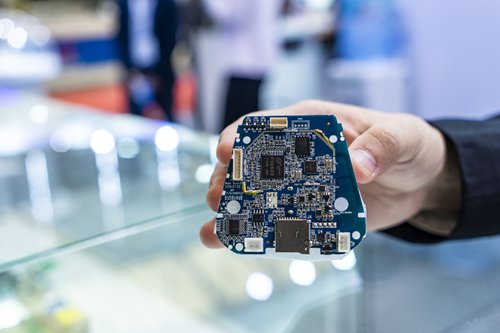China’s first 100% homegrown memory chips in mass production in Shenzhen
Source: Global Times Published: 2020/7/9 13:31:27

An employee showcases a semiconductor integrated circuit at an industry expo on October 31. Photo: VCG
The first completely homegrown memory chips are currently in mass production in Shenzhen, South China's Guangdong Province, breaking foreign technology monopoly and serving as an alternative to imported chips.
Powev Electronic Technology Co, a high-tech storage packaging and testing firm based in Shenzhen, is producing memory chips and Solid-state drives (SSDs) on a mass scale, according to the Shenzhen Special Zone Daily Thursday.
The company's chip lineup includes the first such products to be wholly domestically produced, with each integrated circuit and all production processes completed within China.
The company's products including memory chips and SSDs were first released on JD.com in May, and their sales have reached 25,000 on the platform, Zhang Zhe, the company's deputy general manager, told the Global Times Thursday.
"The lineup was developed to resolve a supply bottleneck faced by the domestic IC industry," said Zhang.
The company said the chips and SSDs are used in personal computers and servers, and at least three domestic PC companies have incorporated the chips in their offerings.
With its products widely used in laptops and PCs, Powev maintains secure cooperation with major system integration companies and computer manufacturers, Zhang said. It also cooperates with some major CPU companies for their products, including the Chinese Academy of Sciences' Loongson, Phytium Technology's FT series chips, and Huawei's Kunpeng chips.
Zhang said the domestic memory chips break a market previously monopolized by US and Korean companies, and can give Chinese businesses more pricing power. Powev's products can now compete with most middle-end foreign memory chips in price and capacity.
"For the mainstream storage chips market, we pose a strong competition to imported chips," Zhang said. Although the price of the chips remains roughly the same compared to its foreign rivals, Zhang said it is important for Chinese companies to step into the highly exclusive market.
On China's JD.com e-commerce marketplace, the Global Times found consumer comments were generally positive with regard to the performance of the chips, with some reviewers directly expressing their favor of fully homegrown memory chips.
It was reported that the company's business volume increased to 350 million yuan ($50 million) in 2019, up from 2018's 20 million yuan.
Xiang Ligang, an industry analyst, told the Global Times that due to their monopoly position, the American and Korean companies were previously able to increase product price largely at their will. A mature and competitive Chinese product will have the potential to bring the market price down.
Posted in: COMPANIES